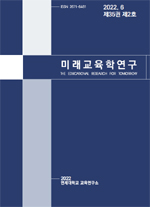역량기반 전공 교육과정 질 관리 체제 및 지표개발 연구
Developing a Quality Management System and Indicators for Competency-Based Curriculum of Major Programs
- 연세대학교 교육연구소
- 미래교육학연구
- 제35권 제3호
-
2022.0975 - 93 (19 pages)
-
DOI : 10.35283/erft.2022.35.3.75
- 451

연구목적: 본 연구는 대학에서 역량기반으로 개편한 전공 교육과정의 질 관리 체제 및 지표를 개발·도출하고 내용의 타당도를 확보하는 데 목적이 있다. 연구방법: Systematic Approach 기법을 기반으로, 2차에 걸친 전문가 델파이 조사를 통해 최종 역량기반 전공 교육과정 질 관리 체제 및 지표를 도출하였다. 연구결과: 역량기반 전공 교육과정 질 관리 체제는 교육과정 편성, 교육과정 운영, 교육과정 지원, 교육과정 성과 및 개선까지 4개 영역으로 구성되었으며, 11개의 세부항목, 총 25개의 지표를 도출하였다. 모든 지표는 CVR 최솟값(.59) 이상으로 나타나 타당성을 입증하였다. 학술적 기여: 본 연구는 역량기반 전공 교육과정을 운영 중인 많은 국내외 학과 및 전공에서 지속적이고 체계적으로 교육의 질을 제고할 수 있는 질 관리 체제를 구축하는 데 기초자료를 제공하였다는 점에 그 의의가 있다.
This paper aims to develop and validate a quality management system and indicators for competency-based curriculum of major programs in 4-year universities. A quality management system and indicators were derived through a systematic approach and two times Delphi tests with experts. The quality management systems includes four areas: curriculum organization, curriculum implementation, curriculum supports, and educational performance and improvement. A total of four areas and 25 indicators were derived, and all indicators showed an average score of 4.0(appropriate) or higher, and the minimum CVR value of .64 or higher to ensure content validity. This study shows factors to consider when designing for university officials who consider to develop a competency-based major program curriculum. This study is meaningful in that it provided basic data for establishing a quality management system that improve the quality of education in many departments and universities operating competency-based curriculum continuously and systematically.
Ⅰ. 서론
Ⅱ. 이론적 배경
Ⅲ. 연구 방법
Ⅳ. 연구 결과
Ⅴ. 결론 및 제언
참고문헌
(0)
(0)